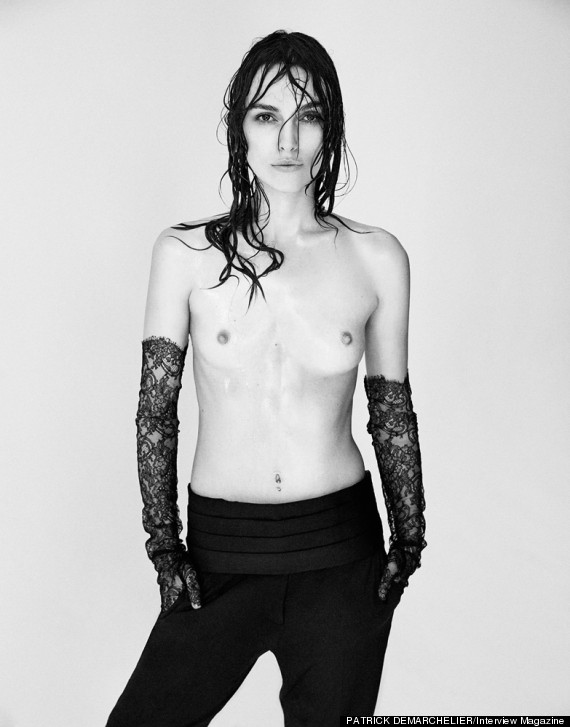*This article contains nudity*
Amongst all of the nude photographs of celebrities
currently circulating throughout the media is one of particular importance.
This month Keira Knightley posed topless for Interview magazine on
the condition that her image would remain unaltered.
After the photo shoot Knightley explains
to the Times that, “I've had my body
manipulated so many different times for so many different reasons, whether it's
paparazzi photographers or for film posters. That [shoot] was one of the ones
where I said: 'OK, I'm fine doing the topless shot so long as you don't make them
any bigger or retouch.' Because it does feel important to say it really doesn't
matter what shape you are...”.
Despite its innate lack of importance, American
society places extreme significance on a person’s physical shape, particularly
when that person is a woman. Popular media, such as music, cultivates the
expectation that “To attract and keep a man, a women should look like a model
or a centerfold” (Bader, 2007). Men are also portrayed in stereotypical ways, for
instance as seen in the representation of the “Cad” which endorses a muscular
physic, powerful social status, and sexual experience (Taylor, 2008). I
therefore applaud Knightly for exposing the reality of women’s bodies and
reassuring the female and male viewers that no body, even culturally deemed
beautiful ones, are ever flawless enough for the media.
I understand that revealing her naked, and
therefore starkly realistic figure, accurately reveals the imperfections that all humans possess. And although I support Knightley’s resistance towards physical perfection, I am skeptical that her message regarding society’s fixation with women’s bodies is best counteracted by exposing her own.
I admit that I am not sure how to effectively eradicate society’s obsession with outer appearances, but I am certain that it needs to stop! Which is why despite my skepticism I applaud Knightley for her intention and attempts to change the media landscape.
Bader, A. (2007). "Love will steer
the stars" and other improbable feats: Media myths in popular love songs.
In M.-L. Galician & D. L. Merskin (Eds.), Critical thinking about sex,
love, and romance in the mass media (pp. 141-160). Mahwah, NJ: Lawrence Erlbaum.
Taylor, L. D. (2008). Cads, dads, and
magazines: Women's sexual preferences and articles about sex and relationships.
Communication Monographs, 75(3), 270-289.


Dear Megan,
ReplyDeleteI really liked your post. At firs I found it really interesting that I had not actually heard more about Kira's decision to pose topless for this magazine. However, then I thought more about it and realized that these days so many people are posing topless that maybe I didn't hear more about it because the media does't position it as "that big of a deal." Nude pictures are becoming the norm, nipples and even pubic hair can be seen in regular advertisements such as American Apparel ads - see link below.
http://store.americanapparel.net/le-grind-glissnet-bodysuit_rsanl304
That being said, while Kira is attempting to relay an important message about body imperfection, I agree with you that she objectifies herself and sets an almost a reverse example by exposing her own body.
Now-a-days women's bodies are more exploited then ever, particularly with the surge of sexting which has increased ten-fold since our generation was in adolescence. Kira, along with many, stand as a role-model for younger girls. When these girls see their favorite actresses bare-all, regardless of the cause, it sends the message that this kind of behavior is normal, and something to be mimicked. There is no talk of "respect" of women's bodies or their privacy in most of these ads. This sends a message to boy's too, who are now being normalized to naked female figures. This normalization has the potential to create less respect for women's desire for the privacy of their own bodies, and a stronger sense of entitlement of them for men.
Great Post!
Samantha Miller